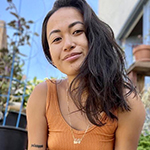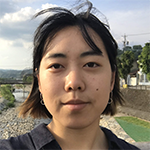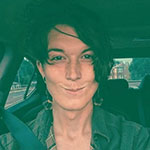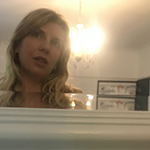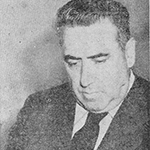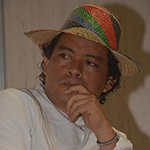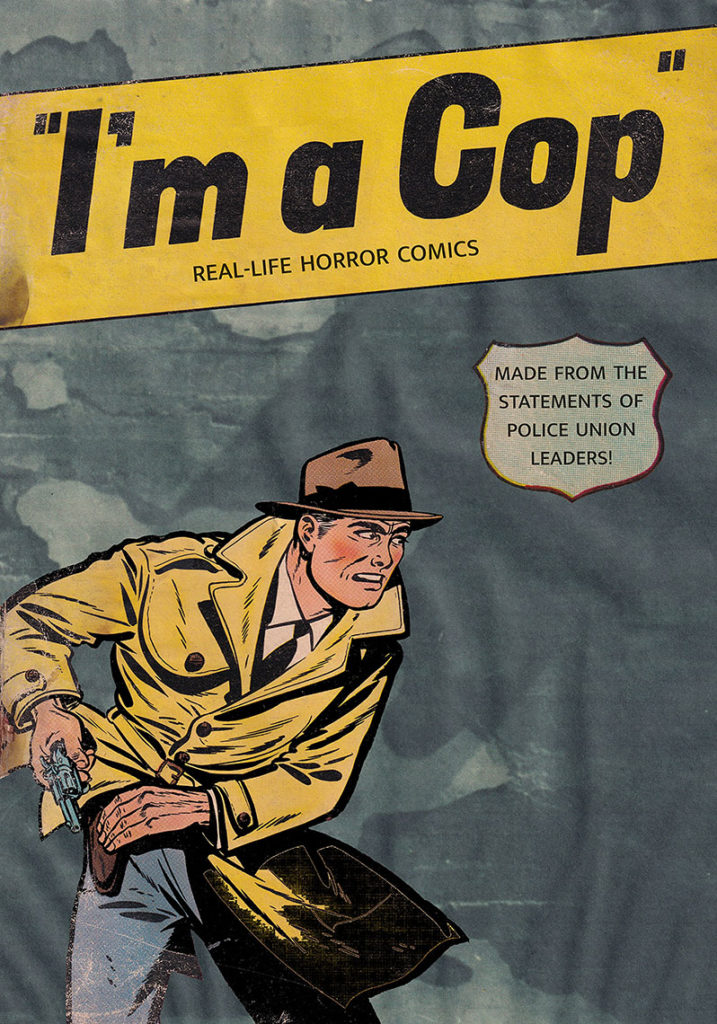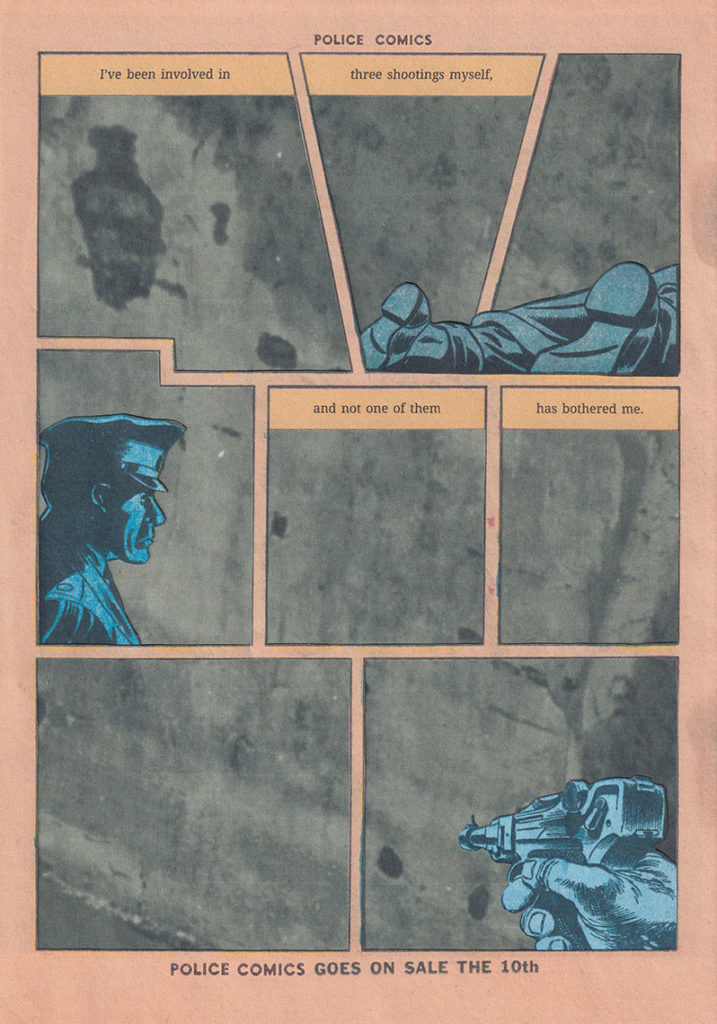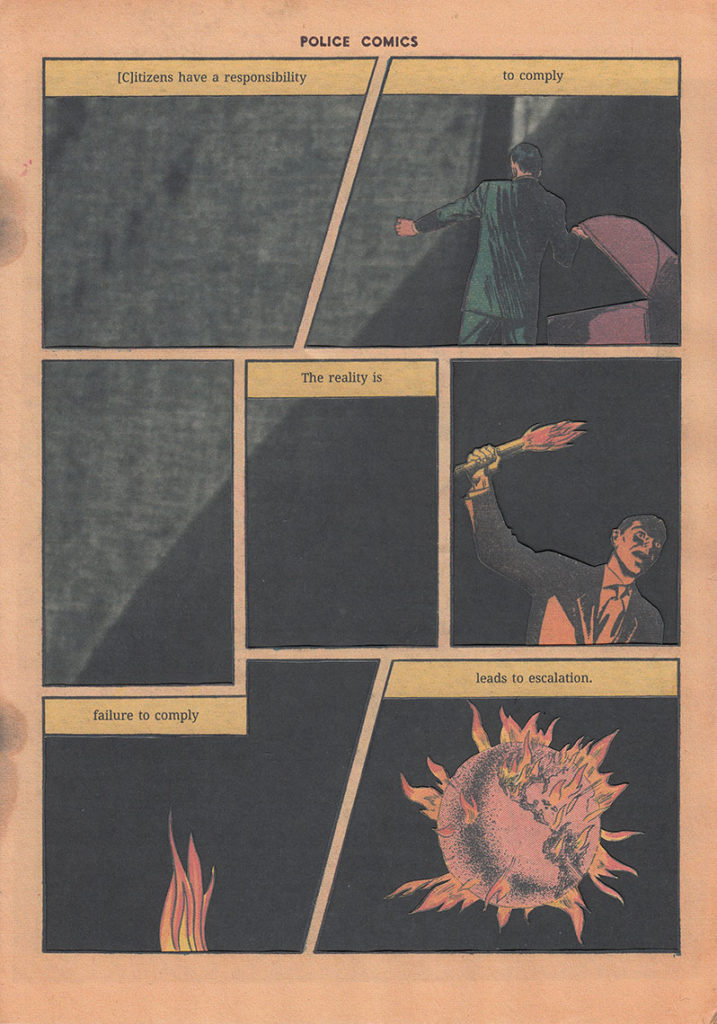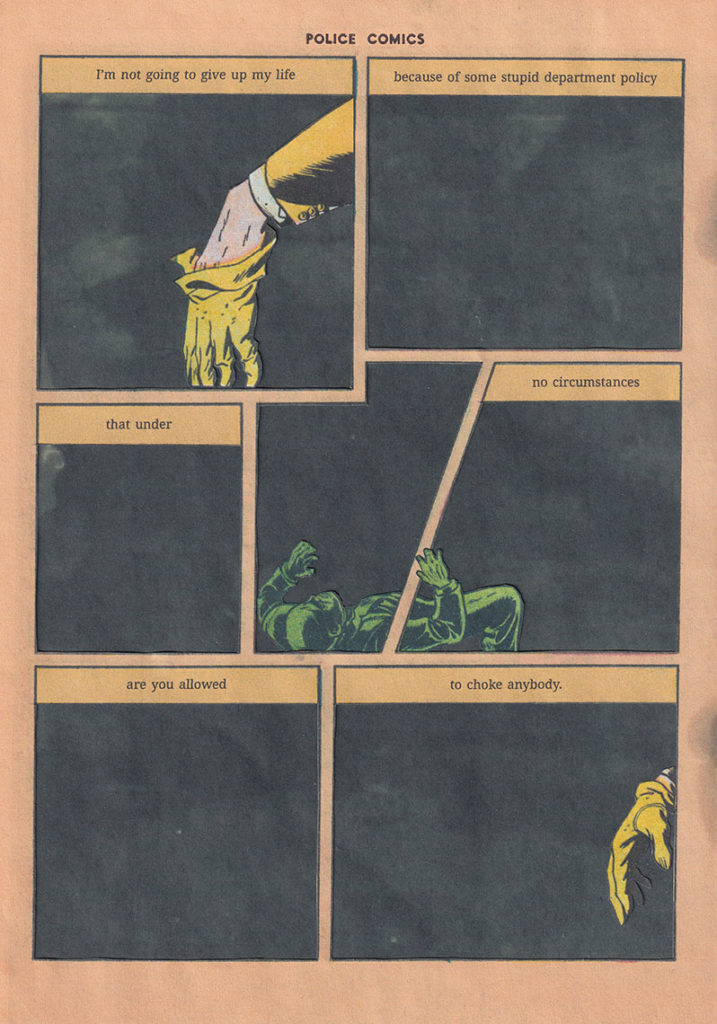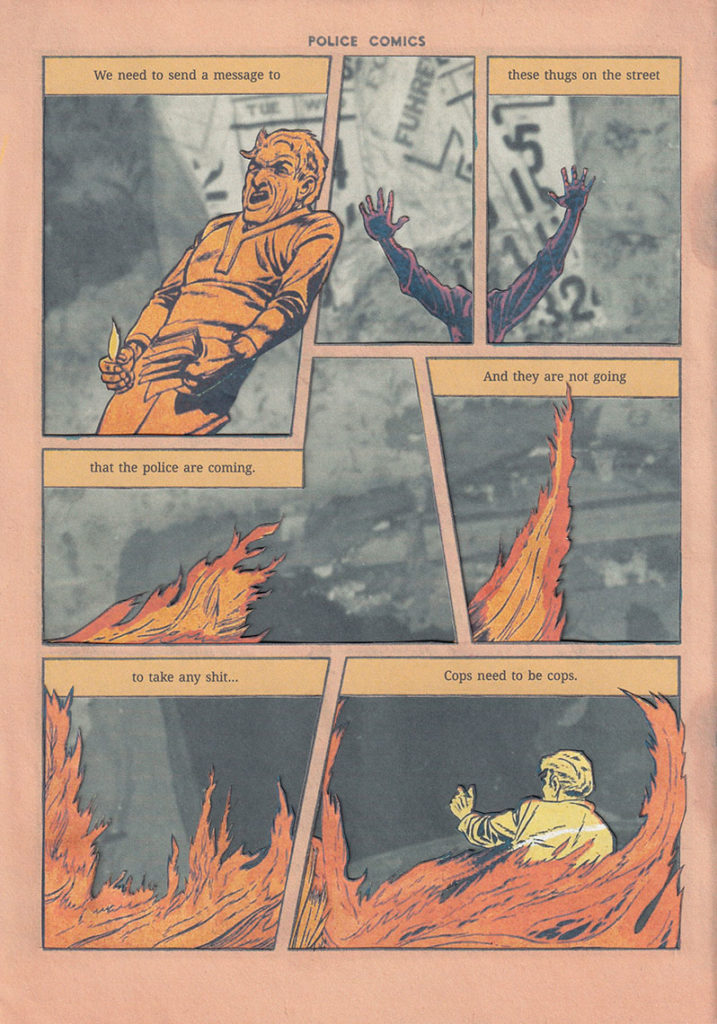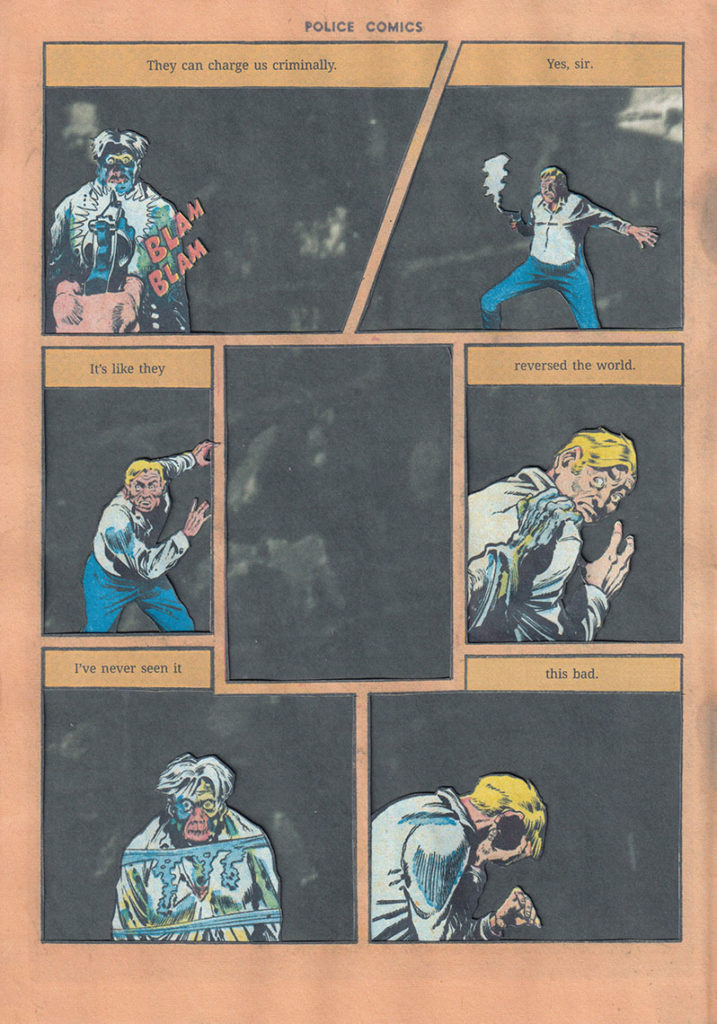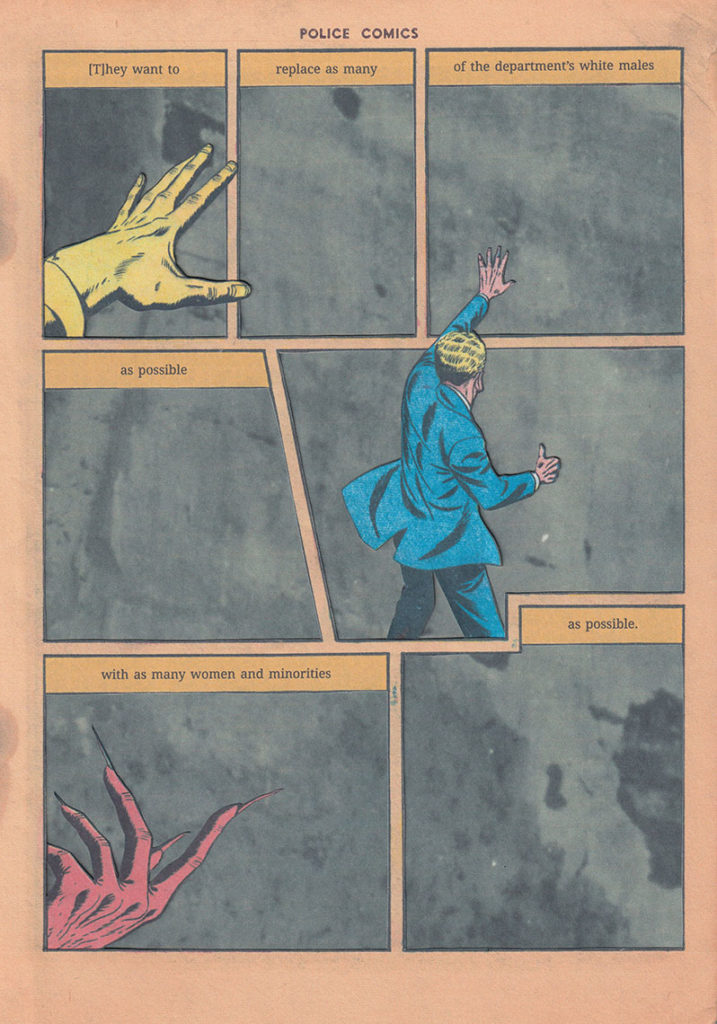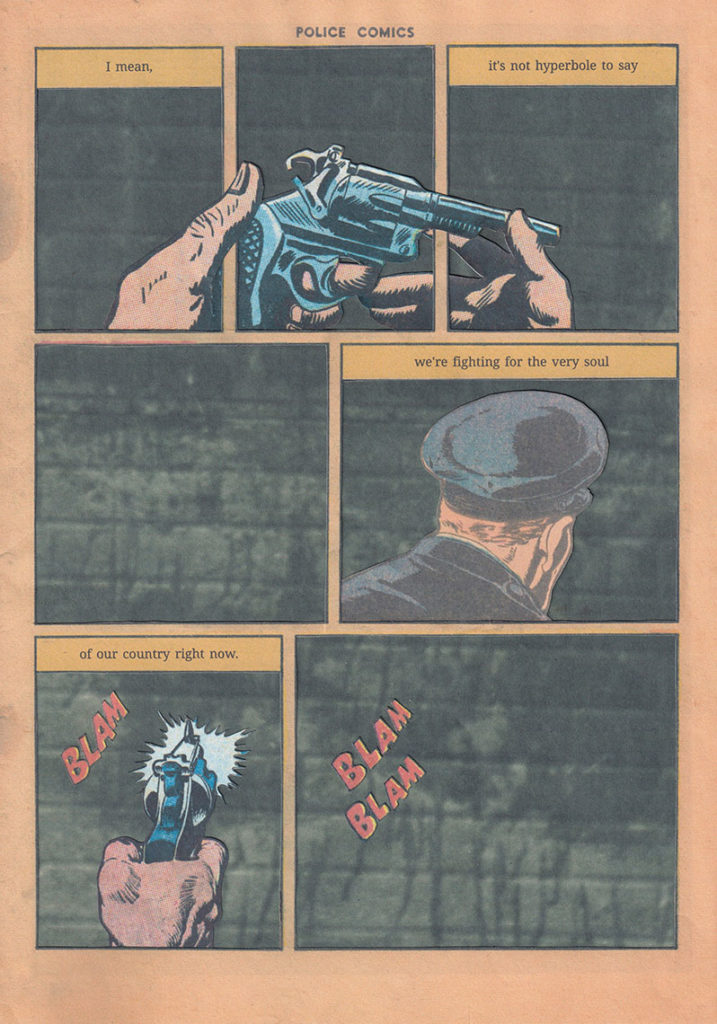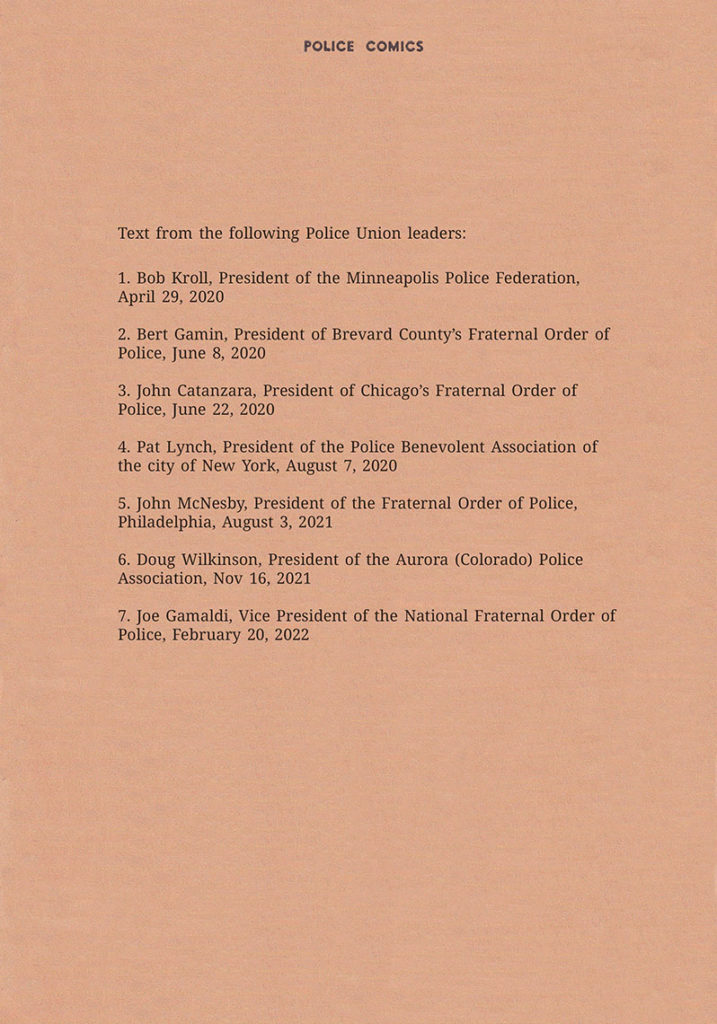By Free, I Meant Silent
I tried to switch into Ms. Senson’s art class, and when they asked why, I said it was because I heard one of her children was killed in a car accident. The look on the principal’s face was that of disgust. I should have known better than to tell the truth. I should have known what I’d be up against.
But I’d been drawing a lot—more than usual. It was taking up my time as well as my headspace, and I wanted to experience it fully. It was Winona Ryder I could not stop drawing. It was like she consumed me, and I wanted to consume her back. I pored over videos of her on YouTube and scoured Netflix for anything she was in pre-Stranger Things, which, it turns out, was a lot. I brought my sketchbook to dinner, to gym class, on the bus. Pages and pages and pages of her face.
My mother sent me to the school therapist, whom I could have danced circles around without ever having read a child psychology book in my life (by now, I’ve read nine; The Developing Mind is my favorite, but I paid particular attention to Odd Girl Out because I was certain it would be used against me, and I was right).
His name was Mark and he had a completely blank and fine-looking face, the kind you forget as soon as you see it. I noticed he was married and I wondered, when his wife closed her eyes, how she pictured him. Did she look at him while they had sex? I wondered who was more intent on pleasing who. I was thinking about this when he placed both of his hands, palms down on his desk, and said my name: Clara. It felt weird coming from his mouth, like a ball he was molding with his tongue. I did not like it. I looked into his eyes and decided it was a mistake for the school to have hired a man for this role.
“Yes,” I said.
“I think you probably know what all of this is about, right?”
I winced. It bothered me when adults were not direct, when they tried to soften the blow of what they were saying by adding words that had no meaning.
“Yes,” I said.
“What do you think it is about?” he asked. On the wall behind him a round Schoolhouse brand clock ticked audibly. I listened to it for some time, trying to pick out a cadence I could speak alongside. Sometimes I used my dad’s metronome when I was sketching. Drawing was the only time when I felt my mind was really free, and by free, I meant silent.
“It is about the fact that I asked to switch art classes because the teacher had experienced tragedy. I felt that a tragic event would surely have rendered itself in her own art, and that that was the kind of art I felt worthy of learning about, and thus concluded that the teacher would be better than the current teacher. It is also about the fact that I draw Winona Ryder constantly, and all of my teachers have noticed it, and so have the students, and that I am probably going to be the target of bullying soon, as I’m sure I’m the target of back chatter and gossip as it is. I have determined that I do not care what my peers think of me, and that in a few years, none of this will matter.”
Mark stared at me. The clock ticked. I smiled. I wanted to show him that I recognized that he was just beginning to acknowledge me as a more mature mind than he’d expected for an eighth grader, but that I was also complacent. It was a combination I’d perfected with my parents. One of his eyebrows furrowed as he wondered what to say next. I crossed my right leg over my left and waited.
“So you’ve discussed this with your mother,” he said.
I couldn’t help but let a little smirk cross my mouth, quickly covering it up with a twisting of my lips to suggest I was deep in thought. That was the best he could do?
“She told me she was going to ask that I see you. But she knows that I know why. Nothing gets past me, she says.”
“And by that you mean, nothing gets past you.”
“Correct.”
“And what about your father?”
“He does everything my mother tells him to do. It’s like the man has no life of his own.”
Mark’s eyes slid behind me to the door and then slowly back. “Right.”
I could sense he wanted more but didn’t know what to ask. “He’s a nice man. He tries. He loves me. They both do.” I wanted desperately to add: Can we be finished now? But I knew we were only at the beginning.
Mark opened a notebook, then closed it. “So where shall we begin?” he asked. “With the art teacher? Or the drawings?”
“Isn’t that up to you?”
***
Winona was born in Minnesota, in a town called Winona, her namesake. Oh, to be named after a town, I thought! She grew up on a commune in Northern California. While drawing, I fantasized about her upbringing, the freedom she had to roam through the fields, stray grasses clinging to her skirts, slicing her bare feet. I imagined the meals she’d have, maybe raw eggs in straw or turnips pulled right from the ground—surely no meatloaf and greasy potatoes, as my mother was keen on making, generally on Mondays, the alliteration of which killed me (Taco Tuesdays followed, but she’d yet to come up with something good for Wednesdays). I thought about her lying under a blanket of blinking stars, her lips dry from the wind, a knitted blanket around her shoulders for warmth she’d dragged from her bed, homemade by a family friend. And how she probably didn’t have to go to school once the kids started bullying her. Thin, androgynous, and wise beyond her years, the others couldn’t place her, didn’t know how to talk to her, didn’t appreciate the difference between “other” and “normal” and the beautiful spaces that exist in between, and how her father, a rare book historian and good friend of Timothy Leary (who I had to look up, subsequently devolving into a fascinating black hole of LSD research), probably stroked her hair and gave her a tumbler of whiskey and said something like: “the only schooling you’ll ever need is exactly what you’ll find right here.”
***
The incident came swift and quick. I was expecting it, and yet, it’s hard to be prepared. I got up for only a moment to buy a Coke—how cliché, right?—and left my sketchbook behind. I should have known. Lacie Peters and her gaggle of friends had been giggling about me all class, but I’d built up such a wall around them that it was like I forgot the wall was there. Rookie mistake. When I came back, there it was: “die bitch,” smeared in what had to be period blood from a used tampon.
Later, Mark asked me how I’d known what it was. And even though I’d not had mine yet, this substance, as I’d come to know over and over again when I got older, however varied in its color and texture, was among the things a woman could always recognize.
***
When my father came to see me in my room, I knew he was trying his best. He always did. With another child, I often believed, he would have succeeded. He hugged me frequently (meaning he draped his arm around my shoulders and left it there for a few seconds), made my eggs the way I liked them, and played the things I used to want to play, when I was still agreeable enough to play with him. He went to work dutifully, kissed my mother dutifully, accepted his nightly scotch dutifully, asked me dutifully how my day was. Today was no different when he approached my bed, where I sat drawing, always drawing, Winona, in the exact same notebook.
He sat down slowly, tenderly, so as not to shift the mattress too much. The charcoal in my hand maintained its smooth lines, unaltered. (I’ll think of this later, much later, after he was long gone—how thoughtful that was, how few people, perhaps none other at all, would have been so considerate.) I was working on shading around her nose.
“I know that one,” he said. “Beetlejuice?”
I nodded.
“Did your mother let you watch that?”
I looked up at him with extreme curiosity mixed with exasperation. “It’s PG, Dad. How old, exactly, do you think I am?”
He was silent for a while, watching my drawing.
“I know what you really want to talk about. I’ll just show it to you,” I said.
Showing it to my mother had been easier—she’d wrestled the notebook from my hands somewhat rudely, though I knew it stemmed from her anger at what had happened more than her frustration at what kind of daughter I was, how different I’d turned out to be than what she’d hoped. She turned the pages with a ginger aggression, sighing each time a turn of the page yielded no results, and when she finally saw it, the smeared blood, some of it bleeding onto the next page in Rorschach clumps, she closed her eyes into tight buttons and pursed her lips out like a duck. She looked funny, and I could have laughed, but it was all just too serious, so serious it was absurd. “And to think that Lacie girl used to be in Brownies with you,” she said.
“Oh, please,” I’d told her. Actually, Lacie had always seemed kind of cool in my mind, like, I thought she might be fun to hang out with if it weren’t for her friends who followed her around like princess puppies.
I wiped the outside of my pinkie joint on the charcoal, blending ever so slightly, focusing as hard as I could on replicating the primness of Winona’s nose. I wanted nothing to be more important than that: than her tiny, perfect, feminine slope. I thought of it pushed up against a pillow, of how water might drip off of it after a shower, if men had kissed her there. And then I turned the pages, six back, until I reached it.
My father stared. He shook his head, back and forth, a slow, rhythmic movement. Then he looked up and sighed, in dialogue with someone—something—else, though not God, whom I knew he did not believe in. I could not figure out what it was he was thinking, and that was the part that bothered me the most. I was aware of my precociousness and prided myself on interpreting adult thoughts, actions, implied movements, of understanding their impulses better than they could themselves. This confounded me. I watched him curiously, this suddenly new and unknown father of mine.
And then he erased it all. He’d come so close—so close to something I did not know I wanted. He put his hand over mine, gave it a small squeeze, and said, “Sorry, kiddo. What a bummer.” He got up, closed the door behind him, and left, leaving me stunned, my hand rendered useless in a swift kick of shock, the artist in me abruptly withdrawn, focused on nothing more than how filthy the charcoal left my hands.
***
Winona was bullied and beat up at school—an early form of what we now call gay-bashing. Some of my favorite photographs of her are at her youngest. In one photo, a school photo, her hair is short and spiked. If you really try, you can probably tell her gender, but it’s tricky, and I liked that her face was a contradiction, two things at once. I liked it because, how can a face be a mystery? Nothing is more mysterious world than a face, nothing more deliberate and unmasked. And yet hers—I stared for hours, drew for hours. I kept thinking: how much of how she looked was intentional? Did she want to stand out? Did she not think she would? Did she not think about it at all? Answering these questions led to more contradictions: that she was either a precocious and progressive pre-teen, or incredibly naïve to the social norms of her peers. And again, the space between fascinated me.
***
Her parents let her drop out. Her education, they said, could be whatever she made of it.
***
In the morning, I lay in bed long past when I should have risen for school. My father had checked in on me, then my mother; I heard them whispering outside my door, with hushed urgency, debating the importance of letting me stay home while I pretended to still be asleep, my head turned toward the wall. They both knew they would, but arriving at that decision was the thing that made them feel like parents. I knew that I would, too, and overhearing this exercise in parenting made me feel doted upon, as well as lonely.
At last, I heard my father say, “all right, all right,” his faint footsteps descending the carpeted stairs. In that moment, I never felt more like an only child, and this awareness was profound, for being an only child was something I bore like a scar. And yet I wondered if I’d enjoy having siblings, and decided, never having been given the chance to know, that I wouldn’t.
The door creaked open, and my mother emerged, her face flushed with anxiety. “Clara, sweetie?” she started. Sometimes I felt like my mother loved her perceived impression of me more than the actual me—it was like, when she entered my room, some amount of love and affection disseminated when she saw the bareness of my room, my black jeans and t-shirts littered across the floor, the charcoal spread across my desk, probably smeared on my face. She sat down on the edge of the bed and rubbed my ankle absentmindedly.
“We’ve decided to let you stay home today,” she said.
“I’m fine,” I said. It felt like my duty to protest. If I was going to be the outcast, surely I should own it. But I felt as defeated as I sounded, and my mother sighed, tipping her head toward the floor.
“Those kids will be punished,” she said.
“I don’t care about that,” I said, and that was true. That was very true.
My mother appeared aghast, and just as quickly, resumed exhaustion. “What do you mean?”
“Their punishment doesn’t matter to me. I don’t care.”
“Of course we do,” she said. There was that inclusive we, the one that made me feel at once loved and excluded. “Mark will want to talk to you again,” she said. “He might call.”
I rolled my eyes exaggeratedly. “He’s a quack,” I said, sitting up and banging my head against the wall behind me. “His help is useless.”
“Clara.” She sat up straight, tucked her hair behind her ears. It was the way she got when she didn’t know how to deal with me, when I assumed she was ticking back all the memories of where she may have gone wrong as a parent. “I just wish you had some friends. Even just one…”
I began to cry. I couldn’t help it, not at all. It surprised me just as much as it did my mother, and as she reached out to wipe the tears away from my face, I felt like I was watching a movie, a terrible movie, far too sentimental, the kind that makes you cringe and yearn for reality. But I allowed this maternal gesture, closed my eyes, and felt the print of her thumb on my skin, and tried to feel it for what it was: a unique combination of pureness and responsibility, the percentages of which I’d never understand.
***
If I’m being honest, I know this much is true: I wasn’t necessarily as ostracized from the other students as I ostracized myself.
***
Mark called at 10:00 a.m. on the dot, as if he was trying to give me space as a teenager, believing I had just wrangled my depressed self out of bed, wolfed down some cereal, and used the minimal energy I had just to answer the phone. In fact, I’d taken that morning to teach myself about coffee. The magical, unduly wonder of coffee: that I’d never experimented with it before alarmed me. But once my mother had left, leaving me in the house all alone (a rare treat), it occurred to me like an epiphany. A simple Google search rendered the coffee maker nothing more than an easy game to play, and within minutes, I was toying with the harsh black liquid in my mouth, waiting patiently for something to change, to pop, to announce itself. It took some time. I took my mug, plastered with a cracking WARRIORS 1ST YEAR CHAMPS, harkening back to days of yore when I played recreational sports like every other child in America, to my father’s easy chair, positioned carefully in between the bay windows, with the piano to the left, and the front door to the right, and I sipped, and I waited. In due time—how much time, I’m not sure—I felt a thin, low buzzing in my temples and behind my eyes, forcing my eyelids to be more open than usual, my hearing more sensitive, and my involuntary gestures—blinking, twitches—to feel profound.
So when the phone rang, I was ready.
“Clara,” he said. “I’m so glad you answered.”
“Instinct more than anything else,” I said. “Being home alone, and all.”
“…Right. I want you to know that we’re taking this seriously. That’s first and foremost.”
“And I want you to know that I don’t care.”
“That can’t be true.”
I rolled by eyes. “And yet, here I am, speaking for myself, using agency, telling you my own truth.”
“Clara.”
“Yes.”
I had befuddled him. I was enjoying myself immensely. The coffee was making my heart race.
“You don’t care that we’re taking it seriously? Or you don’t care that it happened?”
Ah! A question I hadn’t expected. One point for Mark. “I’m glad you’re taking it seriously. It would be way worse if you weren’t. But I don’t care that it happened. And I don’t care if they’re punished.”
“That can’t be—okay, listen. What they did was wrong, very wrong, and they will absolutely be punished, as they should be. Why wouldn’t you care about that?”
“Think about it. If they’re not punished, what message does that send?”
“That they can commit a heinous act of bullying and get away with it.”
“But they expect to be punished. I agree that, within the standard societal expectations, they should be. But if they’re not, it actually might make them think that you don’t care about them. And that would really kick them off their own pedestal.”
“That’s…interesting.”
“Thanks. I’m thinking of writing a book.” I sipped from my coffee mug like I was being interviewed for a national newspaper on what a well-rounded yet misguided childhood looks like. The coffee was really working! I felt like I could attack the game of life and win!
“Clara,” he said again. His voice got soft. “Let me…switch tactics here. Can I ask you something? And can you answer honestly?”
“Try me,” I said, still feeling strong.
“How are you?”
This surprised me. No one had actually asked how I was. I felt a strange and sudden affection for him. Two points for Mark. I thought about telling him that I had cried earlier, that I hadn’t slept at all, but then quickly barricaded myself against his sympathy.
“Better than ever,” I replied.
***
In truth, the pain of it was dull and unrelenting, but not unfamiliar to the way I’d felt for years now.
***
I passed a few hours sprawled in front of the TV, skipping through reality shows, bad talk shows, and cooking shows, which mesmerized me. Food was a pleasure I felt too young to appreciate, but believed that maybe some day I would. At home, we ate to satiate ourselves, a means to an end. My parents seemed to savor few things: my father, his scotch, my mother, a cup of earl gray with honey—these were things they paid careful attention to, the rituals around them as important as the liquid, and the feeling it delivered. I watched a woman with large hands spin sugar into frosting. I watched a man with spiked hair slather corned beef with mustard that fell apart, glistening, into his hands. There were only so many hours I could kill doing this, though, and the entire time, I felt my notebook calling to me, as if it was haunting me.
I tried to ignore it, but the impulse to draw was so strong, I finally decided I’d try it without the notebook. I gathered scraps of paper from around the house, somehow believing that if I used scraps, it would render my drawings less meaningful. I pilfered bits of pencils from my father’s desk drawer, a runny pen from my mother’s old purse, sat down at the kitchen table, and closed my eyes. One of my favorites came to mind first: Winona, head cupped in her hand, a strand of hair falling across her eye, a subtle smirk that was unintentionally sexy, because she was too young to be intentionally sexy. I sketched the eyes first, my usual go-to, but I could not get the pencil to be dark enough, not enough to be worthy of her deeply dark eyes. I tried again with the hair, but the pencil was too wispy, it came out looking like frayed ends. And the pen, of course, was worse: why I thought I’d even try drawing with a pen made me laugh at myself and chuck it across the room, where it sputtered and rolled under a counter.
I wondered, if I’d ever actually made it to Ms. Senson’s class, what she might have taught me.
It was 1:06 p.m.. There was still so much time left in the day. I did not know how I would make it. I could not imagine how people did it, people who did not have jobs or could not work or did not have children or an otherwise more or less daily responsibility to keep them from going absolutely mad. For I felt mad—it was maddening, living with the desire to erase what had happened to me and what would happen, listening to the seconds tick away on the clock in the kitchen, feeling like there was nothing to look forward to. More than a friend, I yearned for a pet. Something to talk to, who wouldn’t talk back, but could offer some affection, or at least look me in the eye, so I would know I was seen.
Without knowing what else to do with myself, I decided to take a nap. I woke to the sound of the garage door opening.
“Clara?” he ventured when he came in. “I came home to check on you.” He approached me slowly, like he was afraid of me. He perched himself on the edge of the couch, rubbing a finger absentmindedly on a fraying strand of fabric. We’d had this couch my whole life, and it was only occurring to me now how old it was, and how truly ugly.
“Did Mom tell you to?”
“No. Do you think I only do what she tells me to do?”
“Yes.”
The look on his face was that of recognition. “Well, you’re right. And you should know that we’re probably getting divorced.”
I sat up quickly. “Wait. Really?”
He nodded. “Don’t tell her I told you.” He slammed his hand against his forehead. “Shit. I shouldn’t have told you that. Not now, with what you’re doing through. Shit. What is wrong with me?”
My thoughts scrambled. I had to focus on the piano.
“I’ve never known how to be a parent.”
I stayed silent, realizing that interrupting now would mean sacrificing learning something significant.
“It’s hard, every day. It’s like it’s all you are: just a parent, nothing else. Or a husband.”
“Want me to just run away then? It would solve all of our problems, apparently.”
He laughed. “No, Clara, don’t you see? If you left, we’d have nothing. You’re everything to us. Everything.” Then he added: “Do we stifle you?”
“Yes. No.” I said.
“Everything is right, and everything is wrong. We can’t guide you at all. Neither can that guidance counselor you’ve got, nor the stupid kids you call classmates.”
“What’s left, then?”
“Yourself.”
“Well, that sucks. I don’t like myself very much,” I grumbled.
“Oh, but Clara, let me tell you a secret. You do! You like yourself very much. And that’s what makes you so great. You are you. You do what you want. You say what you want. You’re probably smarter than your mother and I both, already. You’ve never cared about perception. You’ve never given in. It’s like you’re impervious to scrutiny other than you own.”
My face turned in on itself. This comment was like a hit of dopamine, a sugar rush, the way I felt when I finished a Winona drawing perfectly without revisions.
“Wow,” I said. “That’s pretty cool.”
“And I can’t believe you’re ours. Your mother, who wants to be perfect in everyone’s eyes. And me, who’s never known how to please anyone. And we made you. You’re the best thing we did.”
For once I didn’t have a witty reply. But I did know what I wanted to do.
“Can you drive me to school?”
He looked at me with a blank face. “I can.” Then he narrowed his eyes at me. “What are you up to?”
“Nothing. I just want to go to school,” I said.
“But what about…”
I shrugged. “I can’t stay home forever.”
“Well, that’s true. Look at you, parenting yourself.” He picked up his briefcase. “Well, hop to it, then. Get your things. I’ll drop you off, then go back to work, I guess.”
“Or don’t. They’re not expecting me to go back to school, and that’s why I want to go. They’re expecting you to go back to work. So don’t.”
Then my dad laughed. I saw all the teeth in his mouth and the way his Adam’s apple bobbed when he threw his head back.
“Can you write me a note?” he asked.
“Sure. Should it say, ‘die, bitch’”?
He laughed harder, and then we both did.
“Let the record state that it’s not funny,” he said, wiping tears from his eyes.
“That’s what makes it funny,” I said.
I tore a page from my notebook and wrote a note. My dad won’t be coming back to work today. Let him be.
“Thanks,” he said, holding it in his hands, admiring it as if it were a work of art. Then he folded it up and opened his briefcase, and that was when I saw it: a drawing I had done, tacked into the underside of the case. A colored pencil drawing of myself. I remember doing it, it was early on when I started learning to draw, and I was coloring everything: the kitchen, my sneakers, the air conditioning unit. In this drawing, though, I was just looking out our bay window, and I’d colored in a pair of sweatpants I used to love, purple with green dragons on them.
I don’t know whether he saw me see it, but he closed it shut with a loud snap.
“Off you go, now,” he said.
Lisa’s short fiction has been published in Paper Darts, the Rumpus, Hypertext, StoryChord, Eleven Eleven, Litro, Five:2:One, and others. She is at work on two novels—wish her luck.
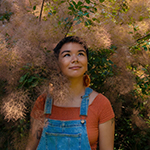

 BACK TO ISSUE
BACK TO ISSUE
